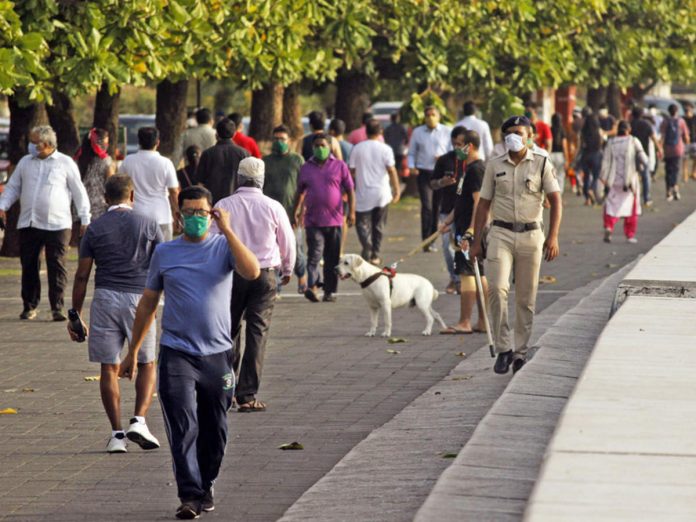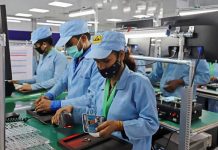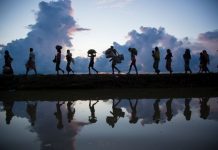This article is written by Raslin Saluja from KIIT School of Law, Bhubaneswar. This article analyses the various violations taking place regarding the COVID-19 prevention protocols and the need to voice such complaints.
Table of Contents
Introduction
The situation which at first seemed to return to normalcy with no lockdowns and people refusing to adhere to the COVID-19 norms led to a steady rise in the cases.
To that end, India still continues to reel under the relentless second wave reporting an even higher number of fatalities than ever. We are back to imposing the lockdowns again, only more strict this time. The respective state governments have taken charge and imposed the necessary protocols as required. The situation that we today are currently facing is the outcome of how we have failed to adhere to the guidelines of practising social distancing, wearing masks, and staying at home which has led to this mass spreading and people dying every passing second due to lack of resources.
Violation of COVID-19 protocol
There are many such instances that reflect the lowly accord given to the government’s guidelines. Despite so many attempts at creating awareness through television ads, caller tunes, banners and posters, there is numerous evidence of disobedience. More or less, each state had its fair share of violations. Be it in the form of students not wearing masks and sitting closely in coaching centres or the shopping malls and stores of essential goods and services as in Odisha, or the violations during carrying out the roadshows and rallies in large public gatherings in West Bengal.
In Kerala, the police registered 20,214 cases across the state for not wearing masks and 8132 cases for not maintaining social distancing. A similar case was also registered for organizing a marriage that was attended by 100 people where only 20 were allowed. Despite the bans imposed on festive events of Christmas, New Years, Holi, etc, major violations and negligence were witnessed in various such events.
Penalty
Pursuant to it, states even started increasing the fine amount. As for Delhi, it increased from Rs.500 to Rs 2,000 which will include not wearing a mask, spitting and consuming of tobacco in public places, violation of COVID-19 quarantine rules, and not maintaining social distancing. In Mumbai, the Brihanmumbai Municipal Corporation (BMC) will impose a fine of Rs 200 for not wearing a mask in public. For Pune, the amount is Rs 500 for the same and Rs 1,000 for spitting in public places. For the repeated offences of spitting, the fine will be Rs 3,000 and three days of public service.
Third-time offenders will have to pay Rs 5,000 and five days of public service. According to a media report, Punjab, Gujarat and Uttar Pradesh are imposing Rs.500 for such violations. While Jharkhand would impose a penalty of up to 1 lakh and a jail term of up to 2 years, Madhya Pradesh makes the violators work as volunteers in hospitals and police check posts. However, it would be an understatement to say that these fines have been able to deter people from violating the rules since many states have been able to collect huge amounts as fines.
The proposal for grievance redressal mechanism: An overview
Experiencing the above-mentioned issues, a petition was filed by the Letzkit Foundation before the Karnataka High Court, wherein it brought before the Court the large congregations happening in the state amidst the pandemic. The application filed attached with a photograph pointed out that even Bruhat Bangalore Mahanagara Palike’s Chief Commissioner himself was not wearing a mask in a recent event while handing over machines to collect fines for violating the norms.
To that end, the Karnataka High Court vide order no. WP 7708/2020, finally directed the state government to set up a grievance redressal mechanism within three days of the order for providing a platform to citizens to file complaints against the violations of covid-19 norms regarding not maintaining social distance and not wearing the masks. The order directed that after the portal is set up, it must be open to the public and wide publicity has to be made regarding the availability of such mechanism through newspapers and media and to be particularly published in offices of local authorities including BBMP. The complaints made will then be forwarded to the state level and city level committee. Those complaints could be submitted in the form of emails or WhatsApp or through any other media said the order given by a division bench of Chief Justice Abhay Oka and Justice Suraj Govindaraj.
Along with that, the Court also clarified that punishment will be attracted under subsection 1 of Section 5 of the Karnataka Epidemic Diseases Act for violation of the rules of wearing masks and maintaining social distance. Even any person who abates or promotes any such activities of disobedience will also be committing an offence under Section 8 of the Act. Thus the Director-General of Police was also directed to issue guidelines to all police officers as officers competent for compounding under Section 10 (1) of the Act to ensure effective and efficient implementation of the penal provisions.
The objectives of the mechanism
To uphold the pillars of administration, a grievance redressal mechanism becomes a part and parcel of it. For an administration to be accountable, responsible, and efficient, it has to have a user-friendly redressal mechanism to address the issues of the citizens of the country. More than anything it provides important feedback considering the working of the administration. The major aim of such a mechanism would be to enable a citizen to lodge a complaint regarding a violation of the covid guidelines. It is also to ensure that the citizens could do so with the use of their cell phones after noticing the breaches for immediate action to be taken by the state authorities.
While fine, as notified, would be as follows:
- For not wearing a mask, failing to maintain social distancing: Rs 250 (in urban areas), Rs 100 (in rural areas).
- For violating social distancing norms in non-air-conditioned halls, departmental stores – Rs 5,000.
- Violation of COVID-19 norms in air-conditioned halls, departmental stores, branded shops (single and multiple brands), shopping malls – Rs 10,000.
- For failing to follow COVID-19 guidelines in starred hotels (three-star and above), marriage or convention halls (500 minimum capacity), other similar public places – Rs 10,000.
- Organisers of public functions/rallies/gatherings/celebrations – Rs 10,000.
Presence of a redressal mechanism during the pandemic: A calling under Article 21 of the Constitution
The right to life is certainly fundamental to our existence and embodies a constitutional value of supreme importance in a democratic society like ours. It is the heart of our Constitution and the most progressive and organic provision in our Constitution which is the foundation of laws. It has been reiterated time and again that the right to health and a safe environment is a part of the right to life, and not wearing masks in public spaces causes an intrusion and violation of the fundamental right of everybody else. We owe this recognition of this right to the fact that the Supreme Court of India, through a series of judicial precedents, logically extended its interpretation of the right to life to include the right to health.
Previous instances
The Supreme Court has been proactive in being a guardian and protector of the health of the public at large. There has been a noteworthy effort by the Supreme Court who repeatedly observed that the expression “life” in Article 21 means a life with human dignity and not mere survival or animal existence, first mentioned in the case of Francis Coralie Mullin v. The Administrator, Union Territory of Delhi. Right to life has been perceived to have a very broad scope which includes the right to livelihood, better standard of life, hygienic conditions in the workplace & right to leisure. Therefore, it is an inherent and inescapable part of a dignified life.
The case of Paschim Banga Khet Mazoor Samity v. State of West Bengal, widened the scope of Article 21, as the court held that it is the responsibility of the government to provide adequate medical aid to every person and to strive for the welfare of the public at large. Even when we read the Directive Principles of State Policy as under Articles 38, 42, and 47, we find them in consonance with these decisions. We observe that it is the duty of the state to ensure the welfare of its citizens and look after their health with respect to the nature of obligations. As held in Bandhua Mukti Morcha v. Union of India, though DPSP does not form a binding obligation and is only of persuasive value, it is the duty of the state to abide by them.
Further, According to Article 19(1)(g) of the Indian Constitution, the fundamental right of all citizens to practice any profession, or carry on any occupation, trade or business is subject to restrictions imposed in the interest of the general public under Article 19(6). The Hon’ble Supreme Court in the case of Burrabazar Fire Works Dealers Association and Others v. Commissioner of Police, Calcutta, held that Article 19 (1) (g) does not guarantee any freedom which is at the cost of the community’s safety, health, and peace.
Current scenarios
As mentioned above, the various courts in their previous orders had highlighted that the right to lead a healthy life is an integral part of Article 21 of the Constitution of India. Thus, it cannot be obstructed by individuals who do not bother to follow the important rules of wearing masks or maintaining social distance. It directly affects others in close proximity to the widely spreading virus, which thrives on such unhygienic conditions.
A similar stance has been taken by the Supreme Court very recently showing regret for people’s lack of will to follow the mandatory guidelines in order to prevent the spread of the virus. The Court also acknowledged that these guidelines and standard operating procedures as issued by the Union Health Ministry majorly stumbled in their improper implementation. To that end, the Court even directed the state governments to submit suggestions on how to control public gatherings and ensure compliance with the requirement of wearing masks and maintaining social distance.
Redressal mechanism under Article 21
So far we can fairly infer that it is the duty of the State to care for the health of the public at large and the Central Government and various State governments have, rightfully and proactively, taken various measures to contain the entry and spread of the COVID-19 pandemic. Be it in the form of lockdowns, or safety guidelines and distancing measures for those who are allowed to keep their outlets open, or police patrolling in various areas, and general norms and guidelines to adhere at all times.
Various newspapers and reports are flooded with articles on nonavailability of resources, or gross violation of norms, and super spreader events or gatherings. There has to be a distinction in forming guidelines and seeing that they are actually being followed. Nowadays, as the countrymen are lying at the mercy of the central and state authorities, it is obvious to note that there has been a huge failure on the implementation part. Having a redressal mechanism would only bridge the gap and help the States to address the situations more efficiently in discharging their duty to protect. It can become a means to an end. It would not only help the state to focus on real-time violations but also to devise appropriate plans to combat the same. Thereby, they can also impose liability and make the disobeying citizens put to better use in serving the society.
Conclusion
Though the case remains pending, it is a welcoming step as only imposing guidelines does not fulfil the duty that the state and centre have towards their citizens. The real value is observed in its implementation and adherence. Further having such a redressal mechanism with proper officers engaged in its efficient working would render accountability on the part of the government. It will establish a two-way discourse and ensure that citizens’ problems are addressed in foreseeing the areas of dissatisfaction and identification of grievance-prone areas.
References
- https://thedailyguardian.com/breach-of-right-to-life-during-covid-19-era-fixing-governments-liability-to-compensate/
- https://blog.ipleaders.in/right-health-part-article-21/
- https://indianexpress.com/article/india/coronavirus-india-cases-covid-vaccination-drive-aiims-chief-randeep-guleria-7259081/
- https://www.hindustantimes.com/india-news/no-mask-violates-the-right-to-life-of-others-says-supreme-court/story-XMLlKDyaj9itnReh61rLTO.html
LawSikho has created a telegram group for exchanging legal knowledge, referrals, and various opportunities. You can click on this link and join:
 Serato DJ Crack 2025Serato DJ PRO Crack
Serato DJ Crack 2025Serato DJ PRO Crack











 Allow notifications
Allow notifications


